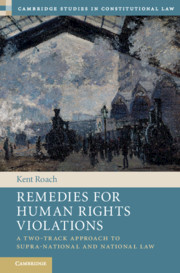Book contents
- Remedies for Human Rights Violations
- Cambridge Studies in Constitutional Law
- Remedies for Human Rights Violations
- Copyright page
- Brief Contents
- Contents
- Acknowledgements
- Table of Cases
- 1 The Importance and Complexity of Remedies
- 2 A Two-Track Approach to Individual and Systemic Remedies
- 3 Interim Remedies
- 4 Remedies for Laws That Violate Human Rights
- 5 Damages
- 6 Remedies in the Criminal Process
- 7 Declarations, Injunctions and the Declaration Plus
- 8 Remedies for Social, Economic and Cultural Rights
- 9 Remedies for Violations of Indigenous Rights
- 10 Conclusion
- Select Bibliography
- Index
4 - Remedies for Laws That Violate Human Rights
Published online by Cambridge University Press: 29 March 2021
- Remedies for Human Rights Violations
- Cambridge Studies in Constitutional Law
- Remedies for Human Rights Violations
- Copyright page
- Brief Contents
- Contents
- Acknowledgements
- Table of Cases
- 1 The Importance and Complexity of Remedies
- 2 A Two-Track Approach to Individual and Systemic Remedies
- 3 Interim Remedies
- 4 Remedies for Laws That Violate Human Rights
- 5 Damages
- 6 Remedies in the Criminal Process
- 7 Declarations, Injunctions and the Declaration Plus
- 8 Remedies for Social, Economic and Cultural Rights
- 9 Remedies for Violations of Indigenous Rights
- 10 Conclusion
- Select Bibliography
- Index
Summary
This Chapter examines the broad range of remedies available for laws that violate human rights. Part I examines non-binding declarations of incompatibility and related supra-national remedies, interpretative remedies, partial declarations of invalidity, suspended declarations of invalidity and prospective rulings. Part II identifies general principles that should inform the choice of remedies. These include respect for the legitimate roles of legislatures in making policy choices not dictated by the interaction of rights and legislative objectives, not allowing remedies to be limited by the form of legislative drafting and presumptions of retroactive relief. Part III applies the two-track approach to remedies with special attention to the dilemmas provided by suspended declarations of invalidity and prospective rulings. Comparisons are made between the Canadian use of exemptions and the South African use of interim guidelines, and between how Canadian and UK courts have responded to assisted dying cases. It also examines the dilemmas presented when legislatures refuse to respond to a declaration of incompatibility. It suggests that courts should have continued to award damages when the UK Parliament refused to respond to a declaration that a ban on prisoner voting was inconsistent with rights.
Keywords
- Type
- Chapter
- Information
- Remedies for Human Rights ViolationsA Two-Track Approach to Supra-national and National Law, pp. 177 - 237Publisher: Cambridge University PressPrint publication year: 2021



